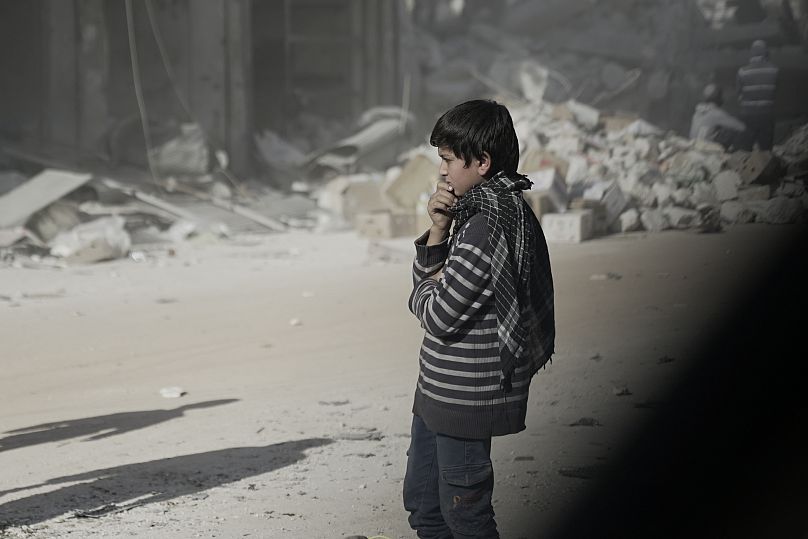Naser Haghamed fled Eritrea as a teenager. Now CEO of Islamic Relief Worldwide, he says faith groups must play a greater role in protecting Syrians and other refugees, and preventing the root causes of displacement.
By Naser Haghamed
When I look at the displaced families of Idlib, I see a younger version of myself. I was just 13 years old when the deadly conflict in my native Eritrea became unbearable for my family.
We had tried to cooperate with the rebels, until the day we couldn’t take it anymore. We fled on foot. We were displaced in our own country at first, and later became refugees. Adapting wasn’t easy. Language barriers meant I struggled at school. I missed home and the family we had left behind. By 20, I had lived in Sudan, Saudi Arabia, Libya, Egypt and the United Kingdom.
Now, as the head of Islamic Relief Worldwide, the world’s largest independent Muslim aid organisation, I once again face the bleak reality of displacement every day. Mine is a relatively calm story compared to what many who must flee today endure.
Globally, more people are now displaced than at any other point in living memory. Some 40 million are internally displaced, and 20 million are refugees. Almost one in five of them is Syrian, many of whom have been forced to flee repeatedly.
In Idlib, families have routinely been displaced five or six times. In isolated, overcrowded fields, or so-called “camps”, they sleep under torn tents and fight over ever-dwindling supplies.
On the front line, dozens of my staff have watched in despair as the fresh uptick in violence recently displaced 30,000 people. They fear that worse is yet come and up to 700,000 people may have to flee for their lives.
For now, a hard-won deal between Turkey and Russia has averted a fresh catastrophe. Turkey, in particular, has fought to stop the unthinkable, with many hoping that this agreement will be the first glimpse of hope after more than half a decade of despair.
But like the millions of Syrians scattered around the region, those in Idlib still face a deeply uncertain future.
Their plight must be a wakeup call to the world to beef up protection for all of those who are displaced - protection that has only grown weaker even as needs have swelled.
The UN’s global compact on refugees and migration, due to be signed this year is a step in the right direction, but I have joined forces with more than 60 other faith leaders who all believe that it does not go far enough.
For starters, it provides scant attention to the millions of internally displaced people. It is also not a binding document and depends on political will.
It will only work if wealthier countries step up and invest to prevent the root causes of violence. This includes adequately funding sexual and gender-based violence services and prevention programmes as well as counselling and medical assistance to those impacted.
World leaders must also boost protection for those on the move and increase resettlement opportunities for those who have legitimate fears about their safety. We need to realise that some people who have lived through war and violence will benefit from psycho-social support and governments must commit to providing or facilitating services to address this need.
Ultimately, we must also endorse and strengthen the role of faith leaders and groups.
In countries of origin, we are already on the front lines supporting people as they flee. We are using inter-faith peace building initiatives to strengthen ties between communities and alleviate the causes of conflict like competition over scarce resources. We have seen this approach work time and again, but we need more support to truly fight violence and displacement.
In host countries, we are also already often the first to respond to new arrivals, providing key services to those in need and helping them integrate. Only by fostering a positive and mutually beneficial relationships between refugees and their host communities can we hope to alleviate growing hostility and division and work to combat xenophobia - something that all societies should strive to do.
We have done this in places like Canada where we have organised hundreds of volunteers to help find housing and education opportunities for Syrian refugees.
We have also done this in places like Jordan where our Islamic micro-finance arm provides empowering interest-free loans to refugees that benefit the community at large.
But more need to be done. We must work to strengthen these faith-based networks throughout the world while also pressuring governments to eradicate barriers to accessing things like employment and education.
By working together, I know we can make a difference and roll back the tide of hostility that has festered in recent years and threatens to undermine progress and unity in far too many places across the world.
Naser Haghamed is CEO of Islamic Relief Worldwide, the world’s largest independent Muslim aid organisation.
Opinions expressed in View articles are those of the author.












